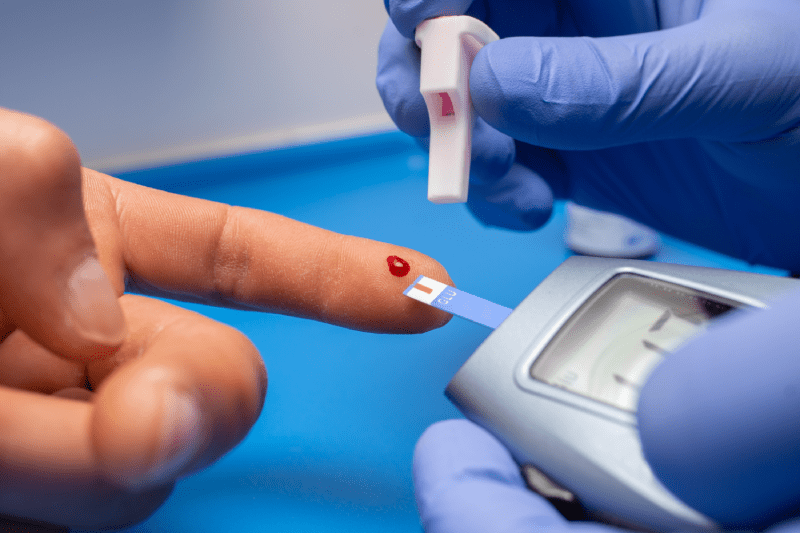What is Metabolic Surgery and Who is a Suitable Candidate?
Metabolic surgery is a surgical method used in the treatment of metabolic syndrome conditions such as diabetes, hypertension, and high cholesterol. These surgical procedures aim to increase the body’s insulin sensitivity and control blood sugar levels by making hormonal and physiological changes in the digestive system. It is generally applied to patients who do not respond to diet, exercise, and medication or who have serious health problems related to diabetes. Suitability is determined after a detailed examination and evaluation.
Why Are Type 2 Diabetic Patients Preferred for Metabolic Surgery?
Type 2 diabetic patients form the most suitable patient group for metabolic surgery. This surgical method is highly effective, especially for patients who develop obesity and have an insulin resistance problem. After the surgery, due to hormonal effects on the digestive system, insulin sensitivity increases, and blood sugar levels improve significantly. Many patients can stop or significantly reduce their diabetes medications a short time after the surgery, which provides a dramatic improvement in their quality of life.
Is Metabolic Surgery Suitable for Type 1 Diabetic Patients?
For Type 1 diabetic patients, metabolic surgery is not as common a solution as it is for Type 2 diabetic patients because Type 1 diabetes is associated with the complete destruction of insulin-producing cells. However, in some cases, especially in Type 1 diabetic patients with insulin resistance and excess weight, surgical procedures can increase insulin sensitivity and help patients need less insulin. This improves the patient’s quality of life and makes blood sugar management easier. An individual evaluation is essential for each case.
What Tests and Evaluations Are Done Before Surgery?
Before metabolic surgery, a comprehensive series of tests and evaluations are performed to determine the patient’s general health status and suitability for the surgery. This process requires the collaborative work of doctors from different specialties such as endocrinology, internal medicine, cardiology, psychiatry, and a dietitian. Blood tests, endoscopy, abdominal ultrasound, hormone analyses, and psychological evaluations are among the routine procedures involved in this process. These preparations ensure that the surgery is performed safely and that the success rate is maximized.
How Long Does the Metabolic Surgery Procedure Take?
The duration of the metabolic surgery procedure varies depending on the chosen surgical technique and the patient’s condition. Generally, these operations, which are performed using the laparoscopic method (closed surgery), can take between 1 and 3 hours. This duration also includes the anesthesia preparation and post-surgery wake-up period. The surgeon’s experience and the hospital’s technological infrastructure are also important factors that directly affect the speed and effectiveness of the surgery.
How Long is the Hospital Stay After Surgery?
The hospital stay after metabolic surgery varies depending on the type of operation, the patient’s general health, and the speed of recovery, but it is generally between 3 and 5 days. During this period, patients are closely monitored for pain management, fluid intake, and nutritional guidance. Before being discharged from the hospital, the surgeon and a nutritionist provide detailed home care and nutritional instructions.
What is the Recovery Process Like and When Can I Return to Normal?
The post-surgery recovery process is usually fast and uneventful. Patients may feel mild pain and fatigue for the first few days, but these can be controlled with medication. Most patients can return to their normal daily activities and light work within 1 to 2 weeks after the surgery. Full recovery and the body’s adaptation to the new diet can take a few months. Adhering to the recommendations of the doctor and dietitian during this process is of critical importance.
What Are the Long-Term Risks of Metabolic Surgery?
As with any surgical procedure, metabolic surgery also has potential risks and complications. These may include infection, bleeding, wound healing problems, and, albeit rarely, complications related to the digestive system. In the long term, vitamin and mineral deficiencies, protein inadequacy, or digestive problems may occur. These risks can be significantly reduced with the correct surgical technique, comprehensive pre-operative preparation, and meticulous post-operative follow-up programs.
What Are the Long-Term Benefits of the Surgery?
Metabolic surgery offers permanent benefits in the treatment of diabetes and related diseases. In the vast majority of patients, blood sugar control is achieved, which can eliminate the need for insulin and other diabetes medications. Additionally, improvements are seen in other components of metabolic syndrome, such as hypertension and high cholesterol. This reduces the risk of heart disease, kidney failure, and other serious health problems. Weight loss also improves patients’ overall health and quality of life.

Is Metabolic Surgery a Definitive Solution?
While metabolic surgery is not considered a definitive cure for diabetes, it is an extremely effective tool for the management and remission of the disease. The surgery aims to control the symptoms of diabetes and provide long-term remission. However, the patient’s adherence to post-surgery nutritional and lifestyle changes is critical for the long-term success of the treatment. Adopting a healthy lifestyle after surgery ensures that the benefits gained are maintained.
Do I Continue Using Diabetes Medications After Surgery?
Most Type 2 diabetic patients can completely stop or significantly reduce their diabetes medications a short time after metabolic surgery. This is made possible by the hormonal effects of the surgery on the digestive system. Whether the medications can be completely stopped depends on the pre-surgery severity of the patient’s diabetes and their post-surgery blood sugar control. Your doctor will make the most appropriate decision for you.
How Do Eating Habits Change After Surgery?
Post-metabolic surgery, eating habits undergo a radical change. A liquid diet is applied for the first few days following the surgery, after which pureed foods are introduced. After a few weeks, patients can slowly transition to solid foods. Patients are advised to pay attention to their protein intake, consume small portions, and chew their food very well. This process is closely monitored by a dietitian.
Is Vitamin and Mineral Supplementation Necessary After Surgery?
Yes, most patients have to take vitamin and mineral supplements for life after metabolic surgery. This is because the changes the surgery makes to the absorption system cause the body to absorb fewer nutrients. Vitamin B12, iron, calcium, and Vitamin D supplements are among the most commonly used. Regular blood tests are important to monitor for deficiencies.
What is the Cost of Metabolic Surgery in Turkey?
The costs of metabolic surgery in Turkey are much more affordable compared to Western European and North American countries. Prices vary depending on the chosen hospital, the surgeon’s experience, the type of surgery, and the services included in the package. These prices can often include additional services such as accommodation, transfers, and post-surgery follow-up.
What Factors Affect the Price?
The main factors affecting the price of metabolic surgery include the type of surgical procedure (e.g., gastric bypass or sleeve gastrectomy), the quality and location of the hospital, the surgeon’s experience, and the services included in the package (such as accommodation, transfers, and an interpreter). Additionally, the patient’s need for extra treatments or tests before the surgery can also increase the cost.
Why Should Turkey Be Preferred for Metabolic Surgery?
Turkey is a preferred destination for metabolic surgery. The main reasons for this include high-quality healthcare services, experienced and internationally accredited surgeons, modern hospitals equipped with state-of-the-art technology, and much more affordable costs compared to Western countries. Patients also have the opportunity to take a tourist trip during their treatment.
What Are the Post-Surgery Complications?
Early-stage post-surgery complications can include wound infection, bleeding, leaks, and anesthesia-related risks. In the long term, problems such as malnutrition, gallstone formation, or nausea may occur. These risks are minimized when the surgery is performed by an experienced team and the patient follows the doctor’s instructions.
What is the Quality of Hospitals and Doctors?
Hospitals and doctors in Turkey provide services at international standards. Many hospitals are accredited by international organizations such as the Joint Commission International (JCI). Surgeons are specialized in their fields and keep their knowledge up to date with continuous training and seminars. This high quality ensures that patients receive treatment with confidence.
Is There a Language Barrier for Foreign Patients?
No, the language barrier is not usually a problem for foreign patients. Clinics focused on health tourism in Turkey employ staff and interpreters who speak English, German, Arabic, and other languages fluently. Patient coordinators ensure that you remain in communication throughout the entire process.
How Are Travel and Accommodation Arrangements Made?
Many clinics in Turkey offer comprehensive packages for foreign patients that include all travel and accommodation arrangements. These services can include transfers from the airport to the hospital and hotel, accommodation reservations, and even city tours. This allows patients to focus solely on their treatment without having to deal with all the logistical details.
When Can I Return to Work After Surgery?
The time to return to work after surgery depends on the type of job. Patients with non-physically demanding jobs can return to work approximately 1 to 2 weeks after the surgery. For those with more strenuous and physically demanding jobs, this period can be extended to 4 to 6 weeks.
When Does Exercise Begin After Surgery?
Light walks and physical activities are recommended starting from the first week after surgery to speed up the recovery process. More intense exercises and activities like heavy lifting should be avoided for the first 4 to 6 weeks. Your doctor will guide you by preparing a specific exercise program for you.
How Do Smoking and Alcohol Consumption Affect It?
Smoking and alcohol consumption negatively affect the success of metabolic surgery. Smoking slows down wound healing and increases the risk of infection. Alcohol is not recommended due to its high calorie content and the negative effects it can have on the digestive system after surgery. It is vital to completely quit these habits before and after the surgery.
Is Psychological Support Needed After Surgery?
Metabolic surgery is not just a physical change but also a significant lifestyle change. Therefore, receiving psychological support after surgery can help patients adapt more easily to their new bodies and eating habits. It is important to ask if your clinic offers psychological counseling services.
Are Metabolic Surgery and Bariatric Surgery the Same Thing?
Metabolic surgery and bariatric surgery are often intertwined terms, but there is a significant difference between them. Bariatric surgery primarily aims to achieve weight loss. Metabolic surgery, on the other hand, aims to treat metabolic diseases like diabetes. While both surgeries cause weight loss, metabolic surgery focuses more on the treatment of diabetes.
Can It Be Applied to Patients Who Are Not Severely Obese?
Yes, metabolic surgery is an option not only for obese patients but also for patients who are not severely obese but whose diabetes cannot be controlled. The BMI (Body Mass Index) values of these patients can often be between 30-35. The most important criterion is that the patient has serious complications caused by diabetes and does not respond to other treatments.
What Are the Non-Surgical Treatments for Diabetes?
Metabolic surgery is one of the last options for diabetes. Non-surgical treatments include lifestyle changes (healthy eating and regular exercise), oral diabetes medications, and insulin injections. For patients who do not respond to these treatments or who have serious health problems related to diabetes, metabolic surgery can be a solution.

How Much Weight Loss Occurs After Surgery?
Weight loss after surgery varies depending on the chosen surgical method, the patient’s initial weight, and their adherence to eating habits. Patients can lose 60% to 80% of their excess weight within the first year after surgery. This weight loss significantly contributes to the improvement of blood sugar levels and overall health.
Is a Guarantee Given for Metabolic Surgery Complications?
No surgical procedure can be guaranteed to have a 100% success rate or be free of complications. However, reputable clinics and surgeons take the utmost care to minimize possible risks. Before treatment, it is important to get detailed information about possible risks and complications from your surgeon and to clarify the post-surgery follow-up plan.
How Are Post-Surgery Check-ups Performed?
Post-metabolic surgery check-ups are very important for the long-term success of the treatment. Check-ups are required regularly throughout the first year after surgery, and then once a year. These check-ups include monitoring the patient’s nutritional status, weight loss progress, and diabetes parameters. Remote consultations are also a service frequently offered to foreign patients.
What is the Difference Between Gastric Balloon and Metabolic Surgery?
A gastric balloon is a device temporarily placed inside the stomach to aim for weight loss by creating a feeling of fullness. Metabolic surgery, on the other hand, provides permanent weight loss and diabetes control by permanently changing the anatomy of the digestive system. A gastric balloon is not a surgical procedure and the weight loss is less and temporary; metabolic surgery is a more permanent and effective solution.
Is There a Risk of Gaining Weight Back After Surgery?
Yes, there is a risk of gaining weight back if the rules of nutrition and lifestyle are not followed after surgery. The surgery is a tool, and its success largely depends on the patient’s own effort. Regular nutrition, exercise, and adherence to the doctor’s advice are the most important ways to prevent weight regain.
How Are Diabetes and Obesity Treated Together?
Metabolic surgery is one of the most effective ways to treat diabetes and obesity together. These surgical procedures address both conditions simultaneously by providing weight loss and improving blood sugar control through hormonal mechanisms. The weight loss achieved after surgery alleviates the symptoms of diabetes and helps in the remission of the disease.
Can I Have a Child After Metabolic Surgery?
Metabolic surgery can increase fertility by correcting hormonal imbalances caused by diabetes and obesity. However, it is recommended to avoid getting pregnant within the first 12-18 months after the surgery. During this period, the body’s weight loss and nutritional balance stabilize. Pregnancy planning should be done in conjunction with your doctor.
What Kind of Diet is Followed Before Surgery?
Before surgery, a low-calorie, high-protein liquid diet is usually followed to shrink the size of the liver and make the surgical area safer. This diet begins 1 to 2 weeks before the surgery. Following this diet ensures that the operation is easier and less risky.
When Should a Decision for Metabolic Surgery Be Made?
The decision for metabolic surgery is made in cases where diabetes cannot be controlled, medication treatments have failed, and the patient’s quality of life is severely affected. This decision is made by a multidisciplinary team consisting of an endocrinologist, a surgeon, and other relevant specialists, after evaluating the patient’s entire health condition.


